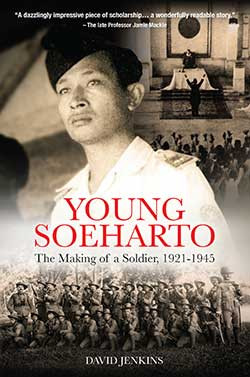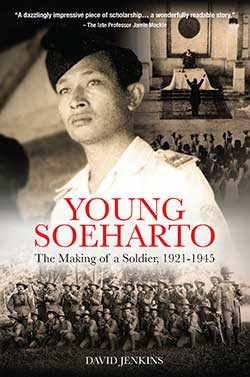Popular Reads
Top Results
Can't find what you're looking for?
View all search resultsPopular Reads
Top Results
Can't find what you're looking for?
View all search results'Young Soeharto': Jenkins details potentially formative events in ex-president's early years
David Jenkins' biography of Indonesia's second and longest ruling president, Soeharto, is a comprehensive and compelling read, with at least two more volumes to follow.
Change text size
Gift Premium Articles
to Anyone
T
he first volume of David Jenkins’ long-awaited biography of the architect of modern Indonesia is now available from Singapore’s ISEAS Publishing.
Released on June 30, 2021, Young Soeharto: The Making of a Soldier, 1921-1945 is a masterpiece. At once comprehensive and compelling, the biography will be a delight to serious scholars and armchair historians alike. While the massive volume runs 503 pages comprising 300 pages of text and over 150 pages of footnotes, bibliography and glossary, it also contains nearly 20 pages of photographs and is beautifully printed. The reader is carried easily on the Jenkins’ smooth prose, sharpened by the Australian journalist’s decades as a reporter and editor of note.
Despite the fact that Soeharto ruled Indonesia with an iron fist and an actor’s smile for 32 years and guided the country with ruthless determination from poverty to middle-class respectability, little is known about the man and the forces that shaped him.
“He was one of the most complex and important Third World leaders of the post-World War II era” Jenkins notes in the introduction, but Soeharto eschewed the egocentric myth-making common to many other long-serving charismatic despots like Mao Zedong, Kim Il Sung and Haile Selassie. The few biographies that were published during his lifetime offer many details about his accomplishments and hint at his personality and how he saw himself in later years, but provide only the barest of clues as to his daily life, the culture and career experiences that molded one of the greatest and most successful leaders of the 20th century – indeed, perhaps the last great Asian despot.
Jenkins came to Indonesia in 1969 as a young journalist and quickly scored a rare interview with Soeharto, who was just consolidating his power after the bloody transition of 1965-68 that brought down Sukarno, Indonesia’s charismatic independence leader and first president, and ushered in Soeharto’s New Order. This first interview was to evolve into a lifetime of research and analysis.
I first met Jenkins when I was freelancing in Jakarta in the late 1970s. He had returned as the correspondent for the legendary Far Eastern Economic Review. During his time in Indonesia, he developed a tremendous stable of contacts and sources and established personal relationships, not only with prominent figures but also many more obscure individuals who had known Soeharto in his early years.
Jenkins is no newcomer to world of academic publishing. His first book, Soeharto and His Generals, was published in 1984 to some acclaim. His latest book has at least three tremendous strengths in addition to its deep scholarship. The author displays both a comprehensive grasp of history and a keen insight into the conditions of Soeharto’s life at each stage. He then blends the two into a seamless tale that traces the arc of Indonesian history, starting with the final throes of Dutch colonialism and on through the turbulent yet liberating Japanese occupation, to the formation of a nascent Indonesian military and ultimately, to the 1945 declaration of independence.



















